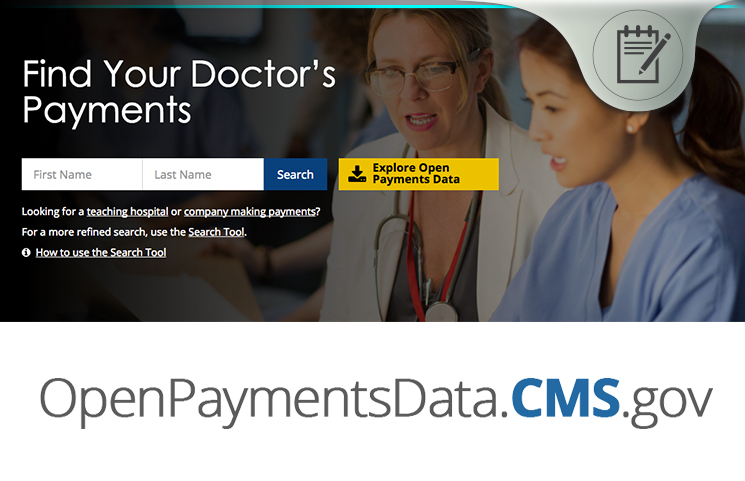Did your doctor prescribe a drug because it’s good for you? Or did your doctor prescribe a drug because they were paid to promote that drug by a pharmaceutical company? Open Payments Data wants to help answer that question.
What is Open Payments Data?
Open Payments Data is a United States government service operated by the Centers for Medicare & Medicaid Services (CMS).
The service, found online at OpenPaymentsData.cms.gov, wants to increase transparency in the medical industry. Using Open Payments Data, you can find which doctors accepted money from which organizations, and how doctors or universities are connected to drug manufacturers.
Open Payments Data was first introduced to the United States in 2014. Former President Barack Obama required the creation of Open Payments Data as part of his health care law. The platform was designed to increase transparency around the financial relationships between physicians, teaching hospitals, and manufacturers of drugs, medical devices, and biologics.
Because of Open Payments Data, manufacturers must submit annual data on payment and transfers of value made to covered recipients. Physicians have 45 days to review and dispute their Open Payments Data before it’s released to the public.
How Does Open Payments Data Work?
Using Open Payments Data is straightforward. The website has a search function you can use to learn more about your doctor or a specific medical organization.
Just type a first name and last name into the online form, then explore payments data for doctors with that name.
You can also search for a teaching hospital or a company making payments.
There are more refined search tools available, letting you narrow down your search by date ranges, keywords, and other indicators.
Some of the searches get very detailed: you can see the types of payments, including specific detail breakdowns right down to travel destinations.
In 2015, Open Payments Data published $7.33 billion worth of money transfers for a total of 11.91 million published records. Since the organization started tracking medical data in 2013, they’ve accounted for over $20 billion in medical industry spending, including over 30 million records.
Use Open Payments Data to Search for your Doctor
Does your doctor really think that new drug is going to help you? Or is she just prescribing the drug because she was recently paid to conduct a study on it by a pharmaceutical company?
These are the kinds of questions Open Payments Data can answer.
Just go to the Open Payments Data website, type in the name of your doctor, and look at any information that comes up.
You can see if your doctor was paid to conduct a study, for example, or if she received certain financial incentives from a drug manufacturer.
If you see results like this, then you can assume that your doctor had at least some bias when she recommended that drug to you. Consider researching other drug options to determine if it was really the best option for your condition – or if bias affected the decision-making process.
Which Doctors Are Taking the Most Payments?
Open Payments Data has given us a treasure trove of information about the world around us, including the financial incentives given to various doctors and medical organizations.
It also allows us to see which types of doctors accept more payments than others, and which pharmaceutical companies are paying the most money to doctors.
An Associated Press analysis of Open Payments Data found that orthopedists, cardiologists, and adult medicine specialists were among the likeliest to receive payments from drug and device companies.
Most of these “payments” took the form of cash. The next most popular payment types were gifts, services, and stock options.
Which Companies Pay the Most Money to Doctors?
On the other side of the equation, we can use Open Payments Data to find that certain pharmaceutical companies give more money to doctors than others.
Genetech, Pfizer, and DePuy Synthes are all among the most “generous” companies in the industry.
The Future of Open Payments Data
President Trump has promised to repeal the Affordable Care Act while also eliminating regulations across America’s economy. Some believe that puts the future of Open Payments Data in jeopardy. After all, Open Payments Data was introduced as part of Obama’s health care initiative, and it’s also a type of regulation.
Nevertheless, Open Payments Data has been supported over the years by members of both political parties in the United States. Despite early criticism after the website was first released, Open Payments Data has mostly avoided scrutiny over the last few months.
Still, critics of Open Payments Data argue that it discourages some doctors from participating in research. Other critics claim the data is too hard to analyze – even when you have professional data combing tools and software.
Ultimately, Open Payments Data provides a valuable service to the American public. The pharmaceutical and medical industries are intricately connected, and Open Payments Data lets us see specific data about the financial transactions taking place between medical organizations, doctors, and pharmaceutical companies every day.









